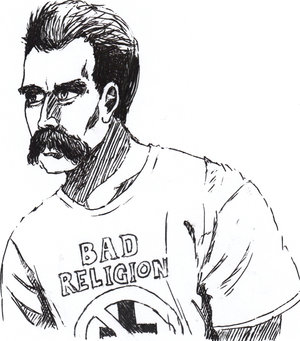
Adult practice: Part 52
|
I know it is still March, not May, but let me use the opportunity to write one little article in advance, because once the heavy work starts, I find it difficult to make an update every two months.
Viewing the pictures of houses and cars being washed away by the tsunami on live TV, seeing nuclear reactors explode while politicians try to convince us that everything is under control and university professors explain that the influence on our health will be minimal - none of us can stay unaffected by that. Especially those of us who have friends and family in the areas direclty hit by the desaster have been almost out of our minds, trying to figure out what to do to be of some help. But there is no easy answer.
One of Antaiji's friends lives in Ofunato (picture above), one of the coastal cities that were almost complete washed away by the tsunami. In the area where his house stood, there are no houses today. We are not even sure if he is alive or dead. People are exchainging information on Google's "person finder", and some one claims to have seen his name on a list of refugees, but I still have no first hand information, nor can I find his name on any online name list (although the name of his 80 year old mother is there, so I hope he is with her).
We dedicated this spring's alm begging (takuhatsu) tour in Osaka to our friend, but it is depressing to realize that money will be the last thing he and all the other victims need now. They need water, food, fuel. But they do not want people to travel into the affected areas, so as not to block the roads. They do not want any extra volunteers either, as they have already too much mouths to feed. Sure, we could put up refugees from the desaster area here at Antaiji, but right now the road is still blocked by one meter of snow, and without heating, even the people who arrived here on the 26th of March complain it is too cold. I am afraid a regular refugee shelter is more comfortable than here. People tell you not to worry about others, to just stay in your place and do your work as usual. Maybe they are right. Every time I check for my friend's name on "peron finder" and elsewhere, or try to call his cell phone, I have the thought that maybe he and many of the others have better things to do than access those pages and say "hello". He has a mother to care for, and maybe many other people around that need his help. If he knew about our worries, maybe he would just say: "Thank you, but mind your own business!"
I came across this sound bite of our good old Fritz Nietzsche at this blog:
If you refuse to let your own suffering lie upon you even for an hour, and if you constantly try to prevent and forestall all possible distress way ahead of time; if you experience suffering and displeasure as evil, hateful, worthy of annihilation, and as a defect of existence, then it is clear that you harbour in your heart the religion of comfortableness. How little you know of human happiness, you comfortable people, for happiness and unhappiness are sisters, and even twins that either grow up together, or as in your case, remain small together.
A nice little reminder of how backward our usual "pursuit of happiness" is, isn't it? I looked for the original and found out that it was a quote from a book called "Die fröhliche Wissenschaft", translated as "Gay science" or also "Joyful Wisdom" into English. The quote is completely taken out of context and quite mistranslated. Fritz isn't talking about comfort or comfortableness, but about compassion ("Mitleid")! Read in context, the whole section prrofs that Fritz was much more of a punk than most punk daddies today. Maybe you can even get a sense of it in the antiquated English version from 1924 that I found here (I am sure there are better translations around, but this is the only one without copyright. The German original is at the bottom of the page):
The Will to Suffering and the Compassionate.
Is it to your advantage to be above all compassionate? And is it to the advantage of the sufferers when you are so?
But let us leave the first question for a moment without an answer. — That from which we suffer most profoundly and personally is almost incomprehensible and inaccessible to every one else: in this matter we are hidden from our neighbour even when he eats at the same table with us. Everywhere, however, where we are noticed as sufferers, our suffering is interpreted in a shallow way; it belongs to the nature of the emotion of pity to divest unfamiliar suffering of its properly personal character: — Our "benefactors" lower our value and volition more than our enemies.
In most benefits which are conferred on the unfortunate there is something shocking in the intellectual levity with which the compassionate person plays the role of fate: he knows nothing of all the inner consequences and complications which are called misfortune for me or for you! The entire economy of my soul and its adjustment by "misfortune", the uprising of new sources and needs, the closing up of old wounds, the repudiation of whole periods of the past — none of these things which may be connected with misfortune preoccupy the dear sympathiser. He wishes to succour, and does not reflect that there is a personal necessity for misfortune; that terror, want, impoverishment, midnight watches, adventures, hazards and mistakes are as necessary to me and to you as their opposites, yea, that, to speak mystically, the path to one's own heaven always leads through the voluptuousness of one's own hell. No, he knows nothing thereof.
The "religion of compassion" (or "the heart") bids him help, and he thinks he has helped best when he has helped most speedily! If you adherents of this religion actually have the same sentiments towards yourselves which you have towards your fellows, if you are unwilling to endure your own suffering even for an hour, and continually forestall all possible misfortune, if you regard suffering and pain generally as evil, as detestable, as deserving of annihilation, and as blots on existence, well, you have then, besides your religion of compassion, yet another religion in your heart (and this is perhaps the mother of the former) — the religion of smug ease. Ah, how little you know of the happiness of man, you comfortable and good-natured ones! — for happiness and misfortune are brother and sister, and twins, who grow tall together, or, as with you, remain small together!
But now let us return to the first question. — How is it at all possible for a person to keep to his path! Some cry or other is continually calling one aside: our eye then rarely lights on anything without it becoming necessary for us to leave for a moment our own affairs and rush to give assistance. I know there are hundreds of respectable and laudable methods of making me stray from my course and in truth the most "moral" of methods! Indeed, the opinion of the present-day preachers of the morality of compassion goes so far as to imply that just this, and this alone is moral: — to stray from our course to that extent and to run to the assistance of our neighbour.
I am equally certain that I need only give myself over to the sight of one case of actual distress, and I, too, am lost! And if a suffering friend said to me, "See, I shall soon die, only promise to die with me" — I might promise it, just as — to select for once bad examples for good reasons — the sight of a small, mountain people struggling for freedom, would bring me to the point of offering them my hand and my life. Indeed, there is even a secret seduction in all this awakening of compassion, and calling for help: our "own way" is a thing too hard and insistent, and too far removed from the love and gratitude of others, — we escape from it and from our most personal conscience, not at all unwillingly, and, seeking security in the conscience of others, we take refuge in the lovely temple of the "religion of pity."
As soon now as any war breaks out, there always breaks out at the same time a certain secret delight precisely in the noblest class of the people: they rush with rapture to meet the new danger of death, because they believe that in the sacrifice for their country they have finally that long-sought-for permission — the permission to shirk their aim: — war is for them a detour to suicide, a detour, however, with a good conscience.
And although silent here about some things, I will not, however, be silent about my morality, which says to me: Live in concealment in order that thou mayest live to thyself. Live ignorant of that which seems to thy age to be most important! Put at least the skin of three centuries betwixt thyself, and the present day! And the clamour of the present day, the noise of wars and revolutions, ought to be a murmur to thee!
Thou wilt also want to help, but only those whose distress thou entirely understandest, because they have one sorrow and one hope in common with thee — thy friends: and only in the way that thou helpest thyself: — I want to make them more courageous, more enduring, more simple, more joyful! I want to teach them that which at present so few understand, and the preachers of fellowship in sorrow least of all: — namely, fellowship in joy!

Der Wille zum Leiden und die Mitleidigen.
Ist es euch selber zuträglich, vor allem mitleidige Menschen zu sein? Und ist es den Leidenden zuträglich, wenn ihr es seid?
Doch lassen wir die erste Frage für einen Augenblick ohne Antwort. – Das, woran wir am tiefsten und persönlichsten leiden, ist fast allen anderen unverständlich und unzugänglich: darin sind wir dem Nächsten verborgen, und wenn er mit uns aus einem Topfe ißt. Überall aber, wo wir als Leidende bemerkt werden, wird unser Leiden flach ausgelegt; es gehört zum Wesen der mitleidigen Affektion, daß sie das fremde Leid des eigentlich Persönlichen entkleidet – unsre »Wohltäter« sind mehr als unsre Feinde die Verkleinerer unsres Wertes und Willens.
Bei den meisten Wohltaten, die Unglücklichen erwiesen werden, liegt etwas Empörendes in der intellektuellen Leichtfertigkeit, mit der da der Mitleidige das Schicksal spielt: er weiß nichts von der ganzen inneren Folge und Verflechtung, welche Unglück für mich oder für dich heißt! Die gesamte Ökonomie meiner Seele und deren Ausgleichung durch das »Unglück«, das Aufbrechen neuer Quellen und Bedürfnisse, das Zuwachsen alter Wunden, das Abstoßen ganzer Vergangenheiten – das alles, was mit dem Unglück verbunden sein kann, kümmert den lieben Mitleidigen nicht: er will helfen und denkt nicht daran, daß es eine persönliche Notwendigkeit des Unglücks gibt, daß mir und dir Schrecken, Entbehrungen, Verarmungen, Mitternächte, Abenteuer, Wagnisse, Fehlgriffe so nötig sind wie ihr Gegenteil, ja daß, um mich mystisch auszudrücken, der Pfad zum eigenen Himmel immer durch die Wollust der eigenen Hölle geht.
Nein, davon weiß er nichts: die »Religion des Mitleidens« (oder »das Herz«) gebietet zu helfen, und man glaubt am besten geholfen zu haben, wenn man am schnellsten geholfen hat! Wenn ihr Anhänger dieser Religion dieselbe Gesinnung, die ihr gegen die Mitmenschen habt, auch wirklich gegen euch selber habt, wenn ihr euer eigenes Leiden nicht eine Stunde auf euch liegen lassen wollt und immerfort allem möglichen Unglücke von ferne her schon vorbeugt, wenn ihr Leid und Unlust überhaupt als böse, hassenswert, vernichtungswürdig, als Makel am Dasein empfindet: nun, dann habt ihr, außer eurer Religion des Mitleidens, auch noch eine andere Religion im Herzen, und diese ist vielleicht die Mutter von jener – die Religion der Behaglichkeit. Ach, wie wenig wißt ihr vom Glücke des Menschen, ihr Behaglichen und Gutmütigen! denn das Glück und das Unglück sind zwei Geschwister und Zwillinge, die miteinander großwachsen oder, wie bei euch, miteinander – klein bleiben!
Aber nun zur ersten Frage zurück. – Wie ist es nur möglich, auf seinem Wege zu bleiben! Fortwährend ruft uns irgendein Geschrei seitwärts; unser Auge sieht da selten etwas, wobei es nicht nötig wird, augenblicklich unsre eigne Sache zu lassen und zuzuspringen. Ich weiß es: es gibt hundert anständige und rühmliche Arten, um mich von meinem Wege zu verlieren, und wahrlich höchst »moralische« Arten! Ja, die Ansicht der jetzigen Mitleid-Moralprediger geht sogar dahin, daß eben dies und nur dies allein moralisch sei – sich dergestalt von seinem Wege zu verlieren und dem Nächsten beizuspringen.
Ich weiß es ebenso gewiß: ich brauche mich nur dem Anblicke einer wirklichen Not auszuliefern, so bin ich auch verloren! Und wenn ein leidender Freund zu mir sagte: »Siehe, ich werde bald sterben; versprich mir doch, mit mir zu sterben« – ich verspräche es, ebenso wie mich der Anblick jenes für seine Freiheit kämpfenden Bergvölkchens dazu bringen würde, ihm meine Hand und mein Leben anzubieten – um einmal aus guten Gründen schlechte Beispiele zu wählen. Ja, es gibt eine heimliche Verführung sogar in alle diesem Mitleid-Erweckenden und Hilfe-Rufenden: eben unser »eigener Weg« ist eine zu harte und anspruchsvolle Sache und zu ferne von der Liebe und Dankbarkeit der anderen – wir entlaufen ihm gar nicht ungern, ihm und unserm eigensten Gewissen, und flüchten uns unter das Gewissen der anderen und hinein in den lieblichen Tempel der »Religion des Mitleidens«.
Sobald jetzt irgend ein Krieg ausbricht, so bricht damit immer auch gerade in den Edelsten eines Volkes eine freilich geheim gehaltene Lust aus: sie werfen sich mit Entzücken der neuen Gefahr des Todes entgegen, weil sie in der Aufopferung für das Vaterland endlich jene lange gesuchte Erlaubnis zu haben glauben – die Erlaubnis, ihrem Ziele auszuweichen – der Krieg ist für sie ein Umweg zum Selbstmord, aber ein Umweg mit gutem Gewissen. Und, um hier einiges zu verschweigen: so will ich doch meine Moral nicht verschweigen, welche zu mir sagt: Lebe im Verborgenen, damit du dir leben kannst! Lebe unwissend über das, was deinem Zeitalter das Wichtigste dünkt! Lege zwischen dich und heute wenigstens die Haut von drei Jahrhunderten! Und das Geschrei von heute, der Lärm der Kriege und Revolutionen soll dir ein Gemurmel sein!
Du wirst auch helfen wollen: aber nur denen, deren Not du ganz verstehst, weil sie mit dir ein Leid und eine Hoffnung haben – deinen Freunden: und nur auf die Weise, wie du dir selber hilfst – ich will sie mutiger, aushaltender, einfacher, fröhlicher machen! Ich will sie das lehren, was jetzt so wenige verstehen und jene Prediger des Mitleidens am wenigsten – die Mitfreude!

| <<< Previous chapter | Contents | Next chapter >>> |
